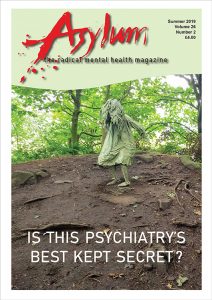Asylum magazine strives to link the politics of mental health to broader progressive political struggles, social movements and campaigns. For example, Extinction Rebellion has been calling attention to the devastating impact of climate change. It has already had significant transformational impact, at least on public consciousness, not dissimilar to that of the #MeToo campaign in raising awareness of sexual violence.

Whilst campaigns to raise awareness about mental health and combat stigma have gained widespread media coverage, their messages are often tame and apolitical (for example, ‘it’s good to talk’).
More radical mental health activism has had significantly less media coverage and, it’s fair to say, less impact. Extinction Rebellion and #MeToo have, within a few months, become global bywords, achieving a higher public profile than many years of radical mental health activism.
We invite you to send us your thoughts on the lessons from these new social movements, and from environmental/climate change activism in particular. For example:
• What lessons can mental health activists learn from the rapid rise and impact of these new movements and campaigns? What can we learn about the role of social media in activism?
• What can mental health activists offer to these new social movements – for example, in relation to the problem of activist burn out and its prevention? Can we share what we understand about how to sustain and look after ourselves and each other, and the outcomes of not doing so?
• We know quite a lot about the connections between sexual violence and mental ill-health, but what about the links between climate change and mental ill health? For example, some people are referring to the idea of ‘ecological grief’ (intense feelings of grief as people suffer climate-related losses of valued species, ecosystems and landscapes).
• What can mental health activism learn from environmental activism and vice versa? What structures do we need to support such learning?
• What direct role can mental health activists play in climate change activism (and vice versa)?
• Is it relevant that autistic identified activists (such as Greta Thunberg and Chris Packham) are taking the lead in climate change activism? Are people who identify as neurodiverse more sensitive to these issues, and/or more willing to take action?
• How have Extinction Rebellion and the #MeToo campaigns been impacting on us personally, and on our mental health?
• What are the implications for our work here at Asylum?
Please let us know what you think and feel about any of this – through letters, articles, images and creative outputs – and maybe share ideas and resources. If we have enough material, we would like to run a special feature.
Contents
- Editorial
- The best kept secret in psychiatry – Maria Grazia Turri *SAMPLE ARTICLE*
- Survivors History: UKAN – Terry Simpson
- Letter to the Magazine – Roger Swan
- A brief experience of multiplicity – Sharon Cretsinger
- A digital future for therapy in the NHS? – Richard Hallam
- A view from inside a medium secure unit – Jerome Sewell
- Creative writing – Mica Montana Gray, Mira Nehlawi, Henry Bladon, Shreya Varma and Mark A. Murphy
- The special education of Dr. Mom – Deborah Ross
- Why I don’t believe “schizophrenia” is an illness – Tim Dreby
- BOOK REVIEW: Get Weird by C. J. Casiotta – William Park
- All it takes is a bit of discipline – Alastor Nemesis
- An intellectual emergency in UK mental health services – Vincenzo Passante Spaccapietra *SAMPLE ARTICLE*
- People mean different things by ‘Recover’ – Roy Curtis
- News and Findings
- Empathy and compassion: out of stock – Dolly Sen
Sample articles
The best kept secret in psychiatry – Maria Grazia Turri
A brief experience of multiplicity – Sharon Cretsinger
An intellectual emergency in UK mental health services – Vincenzo Passante Spaccapietra
Asylum 26(2) electronic
